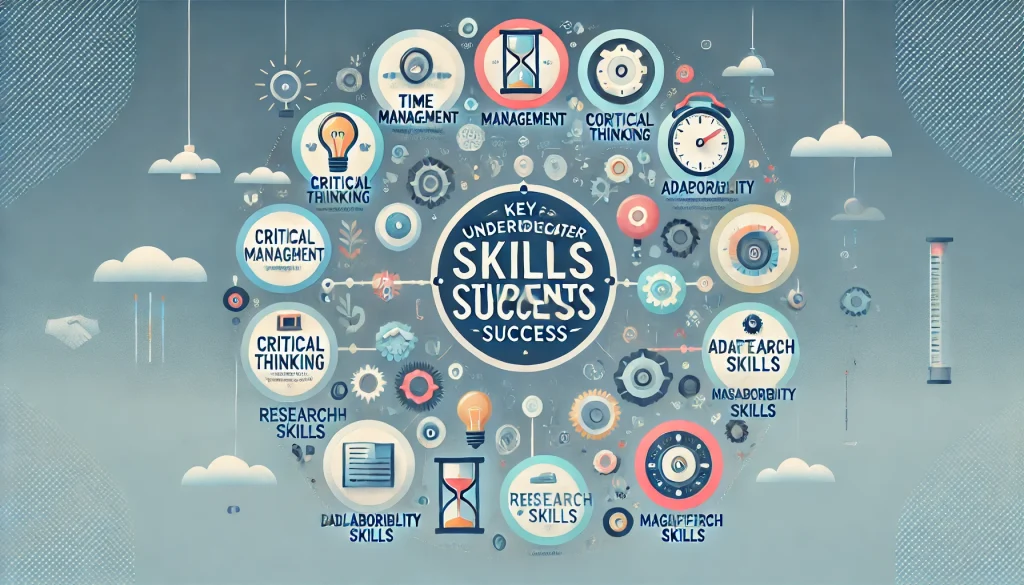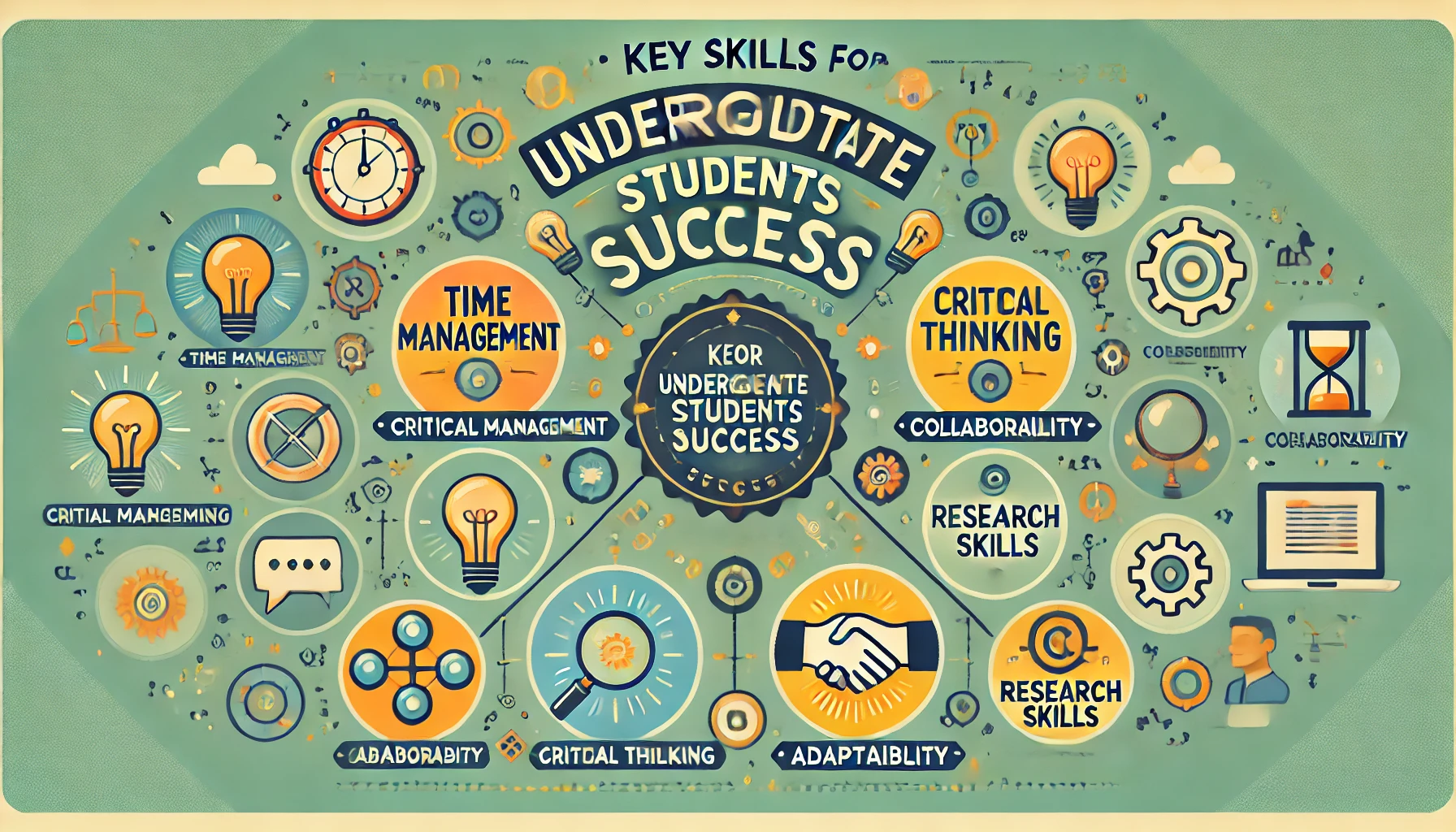As an undergraduate student, there are Key Skills for Undergraduate Students Success. Developing various skills can pave the way for academic success and a promising career. This article delves into critical areas like financial independence, time management skills, work experience, networking opportunities, skill development, campus resources, online job search, resume preparation, and interview skills. Understanding and mastering these areas can significantly enhance your college experience and prepare you for the future.
Financial Independence
Financial independence is a significant milestone for undergraduate students, providing a sense of autonomy and control over their own lives. By earning their own money, students can reduce their reliance on their parents, allowing them to make personal financial decisions and learn budgeting skills. This independence not only helps cover tuition fees, textbooks, and daily expenses but also builds confidence and responsibility.
Achieving financial independence also means students can start saving for future goals, such as traveling, investing, or pursuing further education. Having their own income allows them to manage unexpected expenses and emergencies without needing to borrow money. It teaches the importance of saving and planning, which are crucial skills for adult life. Key Skills for Undergraduate Students Success
Moreover, financial independence can enhance a student’s college experience. With their own earnings, students have the freedom to participate in extracurricular activities, social events, and other enriching experiences without worrying about the cost. This balance between work and leisure contributes to a well-rounded college life, preparing them for the financial realities of the post-college world.
Time Management Skills
Time management skills are essential for undergraduate students who juggle classes, homework, jobs, and social activities. Effective time management allows students to prioritize their tasks, ensuring they meet academic deadlines while fulfilling work commitments. Learning to allocate time wisely helps prevent last-minute stress and enhances overall productivity.
Developing strong time management skills involves creating schedules, setting goals, and breaking tasks into manageable chunks. Tools like planners, calendars, and time-tracking apps can aid in organizing daily activities. By planning ahead and staying organized, students can ensure they have adequate time for studying, working, and relaxing.
Mastering time management not only benefits students during their college years but also prepares them for future careers. Employers value employees who can manage their time efficiently, meet deadlines, and balance multiple responsibilities. Thus, time management is a critical skill that supports both academic success and career advancement.
Work Experience
Gaining work experience while in college provides students with a competitive edge in the job market. Working part-time or taking on internships helps students apply theoretical knowledge to real-world situations, enhancing their understanding of their field of study. This practical experience is highly valued by employers and can make a resume stand out.
Work experience also allows students to develop essential soft skills such as communication, teamwork, and problem-solving. These skills are transferable across various industries and are crucial for professional growth. Additionally, work experience can help students identify their career interests and strengths, guiding their future career choices.
Moreover, students who work during college often develop a strong work ethic and learn how to balance multiple responsibilities. This experience teaches them the importance of punctuality, reliability, and dedication. Overall, work experience not only enriches a student’s resume but also prepares them for the challenges and demands of the professional world.
Networking Opportunities

Networking opportunities are invaluable for undergraduate students as they build their professional connections. By interacting with professors, peers, and professionals in their field, students can gain insights, advice, and support that can guide their career paths. Networking can lead to internships, job opportunities, and mentorships that are crucial for professional development.
Engaging in campus events, career fairs, and industry conferences are excellent ways to expand one’s network. Students can also join clubs, organizations, and online professional groups related to their interests. Building relationships with alumni and attending networking events hosted by the college can provide access to a broader network of professionals.
Effective networking involves more than just making connections; it requires maintaining and nurturing these relationships over time. Students should follow up with contacts, seek advice, and offer help when possible. By building a strong professional network, students can enhance their career prospects and gain valuable support and guidance throughout their careers.
Skill Development on Key Skills for Undergraduate Students Success
Skill development is a key aspect of personal and professional growth for undergraduate students. College provides an environment where students can acquire a variety of skills beyond academic knowledge. These skills include critical thinking, communication, leadership, and technical abilities, which are essential for success in any career.
Participating in internships, part-time jobs, and extracurricular activities offers practical experience and helps students develop specific skills relevant to their chosen fields. For example, joining a debate club can improve public speaking skills, while working in a research lab can enhance analytical and technical skills. These experiences complement academic learning and prepare students for the workforce.
Continuous skill development is crucial in today’s rapidly changing job market. Students should seek opportunities to learn new technologies, attend workshops, and pursue certifications that can add value to their resumes. By being proactive about skill development, students can stay competitive and adaptable, ready to meet the demands of their future careers.
Campus Resources on Key Skills for Undergraduate Students Success
Campus resources are vital in supporting the academic and personal growth of undergraduate students. Universities typically offer a range of services, including libraries, career centers, tutoring, and counseling services, all designed to help students succeed. Utilizing these resources can enhance a student’s college experience and provide essential support.
Career centers, for instance, offer resume workshops, mock interviews, and job search assistance. They can connect students with internships and job opportunities, helping them build their professional network. Academic advising and tutoring services ensure that students receive the guidance and support needed to excel in their studies.
Additionally, campuses often provide health and wellness resources, including fitness centers, mental health counseling, and support groups. These services help students maintain their physical and mental well-being, which is crucial for academic success. By taking full advantage of campus resources, students can enhance their learning experience and personal development.
Online Job Search
The online job search is an essential tool for undergraduate students seeking employment. Websites like Indeed, LinkedIn, and Glassdoor offer extensive job listings, making it easier for students to find part-time jobs, internships, and entry-level positions. These platforms allow users to filter job searches based on location, industry, and job type, making the search process more efficient.
Creating a professional online presence is crucial for a successful job search. Students should ensure their profiles on job search platforms are complete and up-to-date, highlighting relevant skills, experiences, and education. Networking through these platforms can also lead to job opportunities and valuable connections in their field of interest.
Online job searches also provide access to company reviews, salary information, and application tips. This information can help students prepare better applications and make informed decisions about potential employers. By leveraging online job search tools, students can enhance their chances of finding suitable employment opportunities that align with their career goals.
Resume Preparation on Key Skills for Undergraduate Students Success
Resume preparation is a critical step in the job application process for undergraduate students. A well-crafted resume highlights a student’s skills, experiences, and achievements, making a strong impression on potential employers. It should be concise, easy to read, and tailored to the specific job being applied for.
Students should start by listing their education, work experience, internships, volunteer work, and relevant skills. Each section should include specific details about responsibilities and accomplishments, using action verbs and quantifiable achievements where possible. Including a professional summary at the top can provide a snapshot of the applicant’s qualifications.
Regularly updating the resume is important as students gain more experience and skills. Seeking feedback from career services or mentors can also help improve the resume. By preparing a strong resume, students can effectively showcase their qualifications and increase their chances of securing job interviews.
Interview Skills on Key Skills for Undergraduate Students Success
Developing strong interview skills is essential for undergraduate students entering the job market. Effective preparation involves researching the company, understanding the job role, and practicing common interview questions. This preparation helps students feel more confident and perform better during the interview.
Good interview skills include clear communication, active listening, and the ability to articulate experiences and skills relevant to the job. Students should practice answering questions in a structured manner, using the STAR method (Situation, Task, Action, Result) to highlight their achievements. Body language, such as maintaining eye contact and a positive posture, also plays a crucial role.
Mock interviews, either with career services or trusted mentors, can provide valuable feedback and help students refine their responses. Following up with a thank-you note after the interview shows professionalism and appreciation. By honing their interview skills, students can make a positive impression and increase their chances of landing the job.
Conclusion on Key Skills for Undergraduate Students Success
Navigating college life successfully requires more than just academic effort. By focusing on essential skills such as financial independence, time management, work experience, and networking opportunities, undergraduate students can significantly enhance their college experience and future career prospects. Skill development through internships, part-time jobs, and extracurricular activities is crucial for personal and professional growth.
Utilizing campus resources like career centers and libraries can provide essential support and guidance. Embracing online job search tools and preparing a strong resume are key steps in securing employment opportunities. Additionally, developing solid interview skills will ensure students are well-prepared to make a positive impression on potential employers.
By mastering these skills and taking advantage of available resources, students can build a strong foundation for their future careers. College is not just about earning a degree but also about preparing for the challenges and opportunities that lie ahead. With dedication and proactive effort, undergraduate students can achieve success both academically and professionally. Key Skills for Undergraduate Students Success
For more tips on finding student jobs and balancing work with study, check out these useful resources:

